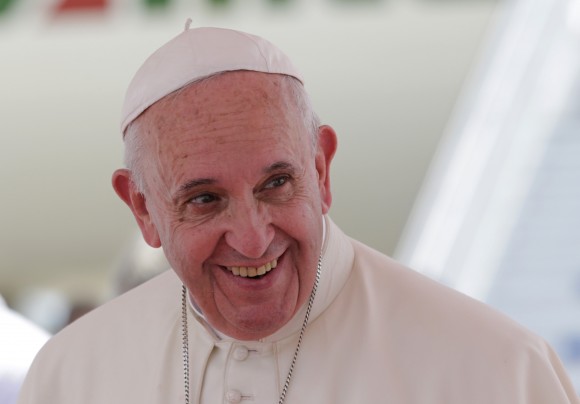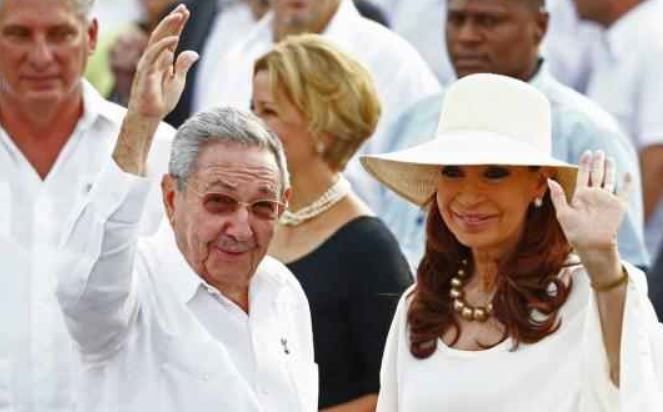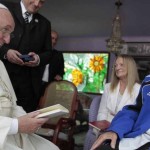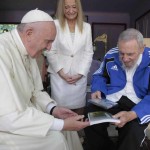
On way to U.S., Pope discusses blockade, dissidents and social doctrine
Excerpts from press gaggle aboard the papal plane flying from Santiago de Cuba to Washington on Tuesday (Sept. 22), as published in the Cubadebate website. Pope Francis spoke alternatively in Spanish, English and Italian. Translator’s clarifications appear [in brackets.]
——
Q.: I would like to know your opinion on the United States blockade against Cuba and whether you’ll speak about it before the U.S. Congress.
A.: The problem of the blockade is part of the negotiation. That’s public. Both presidents have spoken about it. It is a public issue on the road of the good relations being sought. My wish is that things come to a good end, that an agreement is reached that will satisfy the parties.
As to the stance of the Holy See regarding the blockades, previous popes have spoken about that. Not only this one but also other instances of blockade. The Church has a social doctrine about it. I refer you to that; it is quite precise.
With regard to the U.S. Congress, I have already written the speech, so I cannot talk about it. I’m thinking what I’m going to say. But not about that issue specifically; rather, in general, about the bilateral or multilateral accords as signs of progress in the coexistence. That’s the gist [of the speech.] The issue [of the blockade] is specific. I’m racking my memory and I don’t to misspeak, but the specific issue [of the blockade] is not mentioned.
Q.: During your trip, 50 dissidents were arrested outside the offices of the Papal Nunciature while they sought to meet with you. Would you like to meet with the dissidents. And, if the meeting were held, what would you tell them?
A.: I’m not aware that that happened; I’m not aware at all. And I cannot say Yes or No; frankly, I don’t know. And your questions are hypothetical — Would I like? What would happen?
I like to meet with all people. I believe that, first, every person is a child of God and has rights. And second, dealing with someone else is always rewarding. In other words, that’s how I respond to the hypothetical. […]
First, it was made clear that I would not grant audiences. Because requests for an audience came from other sectors, including from some head of state. And no, I am visiting a country and no audience was scheduled with dissidents or any others.
[Translator’s Note: “Some head of state” may have been a reference to President Cristina Fernández de Kirchner, who was in Havana during the Pope’s visit.]
Second, from the Nunciature phone calls were made to some persons who are among the dissidents and they were told that I would gladly greet them once I got to the Cathedral. That did happen, but because no one identified himself as [a dissident], I don’t know if they attended or didn’t.
I greeted the sick people on wheelchairs, but none identified himself as a dissident. And, child, I don’t know what I would say to them; I might wish them the best, as I do to everyone […] You deserve a Nobel Prize for your hypotheticals.
Q.: During your meeting with Fidel [Castro], did you have a feeling that he has repented?
A.: Repentance is a very intimate thing. A matter of conscience. At the meeting with Fidel, I spoke about well-known Jesuits, because I took a book by the Jesuit priest Llorente as a present for him. Also a CD with the conferences by Father Llorente. In addition, I had prepared two books by Father Pronzato that he’ll surely appreciate. We talked about those things.
[Translator’s Note: Armando Llorente was a Jesuit priest who taught Fidel Castro at the Belén School in Havana in the 1940s. Expelled from Cuba after the Revolution, he died in 2010 in Miami at age 91. Alessandro Pronzato is an 83-year-old theologian and writer who lives near Turin, Italy.]
We talked a lot about the encyclical Laudato Si. [Fidel] is very interested in the subject of the ecology. The meeting was not formal but spontaneous. His family was present there. […] We talked about these things. About the encyclical, a lot, because he’s very concerned about this.
We did not talk about the past. Well, we did talk about how Jesuits were, how they made him work, about all that, yes.
Q.: Some sectors of U.S. society are wondering whether the Pope is Catholic. Some have talked about a communist Pope and now others are talking about a Pope who is not Catholic. What do you think?
A.: I am sure that I have not said a single thing that is not in the social doctrine of the Church. One colleague told me that I had reached out to the peoples’ movements and asked me, “Will the Church follow you?”
I told him, “I am the one who follows the Church.” And it seems to me that I’m not wrong here. […] Perhaps an explanation of mine has given the impression of being a bit left of center, but it would be an error in interpretation. No, my doctrine about all this — the Laudato Si, economic imperialism, all that — comes from the social doctrine of the Church.
And if it’s necessary for me to recite the Creed, I’m willing to do it, hmm?
Q.: In your last trip to Latin America, you criticized the liberal capitalist system harshly. In Cuba, it seems that your criticism of the communist system was not very severe. Rather soft. Why the difference?
A.: In the speeches I made in Cuba, I always put the accent on the social doctrine of the Church. But the things that should be corrected I said clearly, not with perfumed softness. […] I have not gone beyond what I wrote — harshly — in the Encyclical and in Evangelii Gaudium about savage liberal capitalism.
It’s all written there; I don’t remember having spoken anything beyond that. […] I have said what I have written — and that’s a lot, a lot.
Q.: Why did you decide not to meet with the dissidents? Will the Catholic Church have a role in seeking for openings in political freedom, given the role it played in the reestablishment of relations between Cuba and the United States.

A.: Firstly, the “them,” not meeting with “them.” No, I didn’t give any private audience. [Audiences] are for everyone. There was a request from a head of state. The answer was No, and that had nothing to do with the dissidents. I’ve explained about how the dissidents were treated. The Church in Cuba made several lists of pardon requests. About 2,200 [prison inmates] were pardoned.
Q.: It was more than 3,000.
A.: It was more than 3,000 and there are still cases under study. The Church in Cuba is committed to work on the pardons. […] One theory is that general pardons be issued every year or two. The Church is working and has worked. […] It has requested releases and will continue to do so.
[Photo at top by Ismael Francisco / Cubadebate.]



